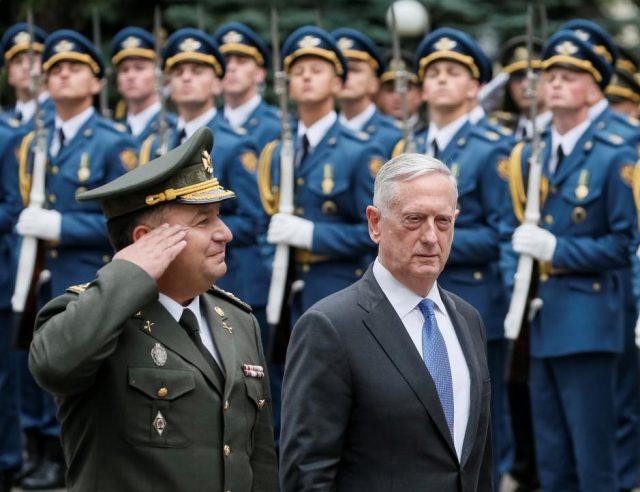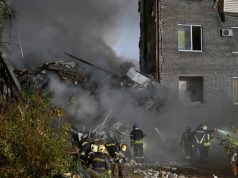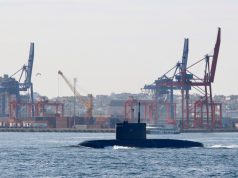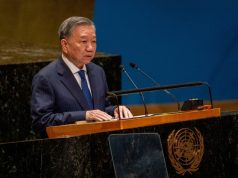
KIEV — U.S. Defense Secretary Jim Mattis on a visit to Ukraine on Thursday said Washington would keep up pressure on Russia over what he called its aggressive behavior and signaled his personal support for providing weapons to Kiev.
Mattis said Russia had not abided by the Minsk ceasefire agreement meant to end the separatist conflict in eastern Ukraine and that the United States would maintain sanctions on Moscow.
“Despite Russia’s denials, we know they are seeking to redraw international borders by force, undermining the sovereign and free nations of Europe,” Mattis told reporters, alongside Ukrainian President Petro Poroshenko.
Mattis’s visit, timed for Ukrainian Independence Day, is the second high-profile show of U.S. support in as many months, after U.S. Secretary of State Rex Tillerson came to Kiev in July.
Ukraine has counted on U.S. support against Russia since a pro-Western government took power following street protests in 2014 when the Kremlin-backed president fled the country.
But some of President Donald Trump’s comments during the election campaign last year, such as appearing to recognize Crimea as part of Russia, stoked fears in Kiev that Trump might mend ties with Moscow at Ukraine’s expense.
While emphasizing Trump had yet to take a decision on the issue, Mattis signaled his personal support for a longstanding Ukrainian request for defensive weapons, which could include anti-tank Javelin missiles and anti-aircraft systems.
Mattis also played down fears, voiced by the previous White House administration under Barack Obama, that supplying weapons could escalate the situation.
“On the defensive lethal weapons, we are actively reviewing it, I will go back now having seen the current situation and be able to inform the secretary of state and the president in very specific terms what I recommend for the direction ahead,” Mattis said.
“Defensive weapons are not provocative unless you are an aggressor and clearly Ukraine is not an aggressor since it is their own territory where the fighting is happening,” Mattis said.
Poroshenko said he was “satisfied” with the progress on discussions about weapons, and also said he and Mattis had discussed the possibility of a U.N.-backed armed force being sent to eastern Ukraine.
Relations between Ukraine and Russia went into freefall after Moscow’s annexation of Crimea in 2014 and the subsequent outbreak of a Kremlin-backed separatist insurgency in eastern Ukraine that has killed more than 10,000 people.
Russia denies sending troops and weapons to eastern Ukraine.
Huge boost
According to U.S. officials, a plan to provide defensive weapons to Ukraine has made its way to the White House but has not been signed. Thus far the Pentagon says it has provided $750 million in non-lethal aid to Ukraine since 2015, which includes radars and uniforms.
Supplying weapons “will be a huge boost of support to Ukraine,” said Michael Carpenter, a former deputy assistant secretary of defense for the region.
Carpenter said the weapons under discussion cannot effectively be used to take territory, which means providing them would help stabilize the situation.
U.S. Senator John McCain, chairman of the Senate Armed Service Committee, also pressed the Trump administration to act.
“Secretary Mattis’ visit to Kiev provides yet another opportunity for the United States to correct its policy toward Ukraine and provide the lethal defensive assistance the country needs to defend its sovereignty and territorial integrity,” McCain said in a statement on Wednesday.
Mattis’ strong words against Moscow on Thursday are likely to reassure eastern European allies who are concerned about Russia’s military activity in region, including planned war games in September.
Russia and Belarus aim to hold joint exercises that some North Atlantic Treaty Organization allies believe could number more than 100,000 troops and involve nuclear weapons training, the biggest such exercise since 2013.
Earlier this year, Estonia’s defense minister said Russia may use the exercises to move thousands of troops permanently into Belarus in a warning to NATO.
Russia has dismissed Western worries about the war games as “buffoonery.”









